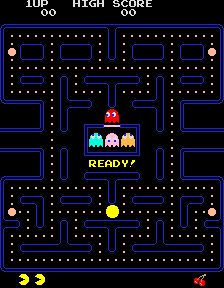
I'm very fond of the 'JRPG' videogame genre: for those who don't know what it is, it's the class of Role-Playing Games that are developed in Japan. This distinction has been made because, compared to classic, 'western' RPGs like Dungeons & Dragons (now often called 'WRPGs'), these games have a generally different 'feel', due to their design being based on different priorities. I'm not going deeper into this, at least not now.
I read that the first electronic RPG to be published in Japan was some Dungeons & Dragons based game; Dragon Quest is surely the most recognized though, and now it is a well-established series.
What kind of game is Dragon Quest? To put it as simple as possible: the main series of games (there are other games based on it which may cover other genres) usually has you controlling an adventurer in a fantasy world with medieval setting, magic and monsters. In some of the episodes your objective is clear from the start: you're some kind of hero who sets on a quest to slay some demon and bring peace to the world. You may get help from other game characters, who may accompany you in your journey and aid you in battle.
Your travels involve going from town to town, castle, 'dungeon' (i.e. a place with monsters and treasure), in search of items that will help you in your quest, gaining experience from fighting against beasts, monsters and demons. You can engage battles randomly, or have pre-set encounters with stronger enemies: fighting takes place in a different screen than that which displays your exploration, you take turns to plan your battle actions (and possibly those of your companions) and watch the two sides exchanging blows and spell-castings. Winning a fight may net you experience points (which make you stronger), Gold (the game's currency) and useful items. You may use Gold to buy stronger equipment and healing items, which make the battles easier.
The farther you go in your travels, the stronger your enemies become, so it's important to get experience and better equipment to survive and get to the last battle strong enough to win. These games have a lot of strategy to them, and they last quite long compared to action games (they also need a longer development time to balance things just right). This is more or less what all Dragon Quest games are about; of course, each game has its own story and peculiarities which make every episode enjoyable and fun to play.
Yes, they're fun to play indeed! Provided you
do like some strategy in videogames, and don't mind the fact that the game mechanics feel somewhat 'archaic' (the series has about 22 years upon its back), you'll find they give a great sense of adventure and rewarding 'growth'.
Too bad that Dragon Quest isn't nearly as popular outside Japan as it is there. Fortunately, thanks to improved distribution and various remakes of the older episodes, they're getting some visibility even in Europe. The next game coming out for the series in the USA and Europe is Dragon Quest V, one of the episodes which were never released in a language other than Japanese. I've never played the first 3, maybe I should try importing the USA versions.
 I laughed when I first read that sentence, because taken out of context (together with my limited knowledge of English) it sounded funny. This is a church of the goddess Tria, because the game was developed by Tri-Ace.
I laughed when I first read that sentence, because taken out of context (together with my limited knowledge of English) it sounded funny. This is a church of the goddess Tria, because the game was developed by Tri-Ace.





 The character selection screen (your choice makes you go through the story with a slightly different point of view)
The character selection screen (your choice makes you go through the story with a slightly different point of view)







